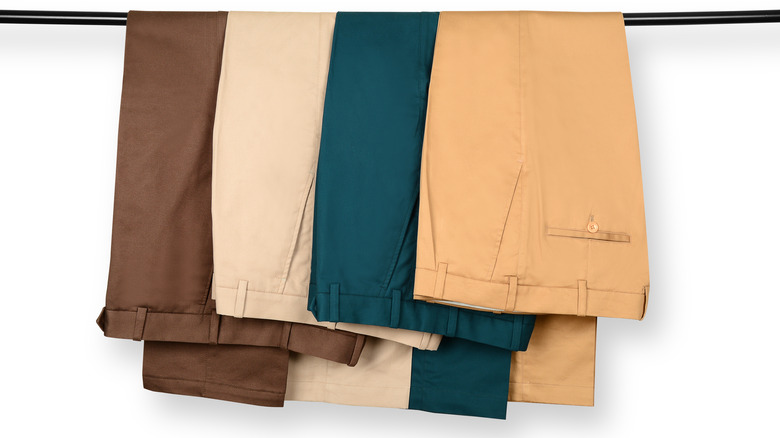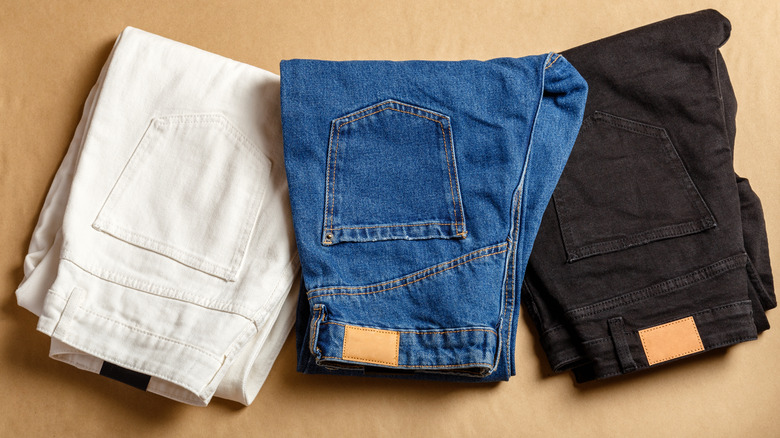The Lost Pair Of Pants That Led To A $54 Million Lawsuit
The history of the legal profession in the United States is filled with head-scratching lawsuits filed for the most picayune and trivial of reasons. There's even an annual award for the worst frivolous lawsuits filed in the previous year: the Stella Awards, named for an older woman who sued McDonald's after she spilled hot coffee on her lap (although, to be fair to Stella, there's more to the story).
One of the most egregious frivolous lawsuits in recent years came out of Washington, DC, in 2005 when a man — a judge, no less — sued a dry-cleaning business for tens of millions of dollars over a missing pair of pants. It took years for all of the legal maneuverings and appeals to shake out, but when the dust had settled, the dry cleaners had lost considerable business, and the judge was out of a job. Meanwhile, the case became an example of what many consider to be a desperate need for tort reform in the United States, which is to say, making it harder for people to file frivolous lawsuits and, by extension, forcing people to pay for their defenses against such suits.
'Same-day service' and 'satisfaction guaranteed'
Just about every brick and mortar business has signage at the front to inform customers about this and that: their hours, their phone number, various store policies, etc. As LexisNexis explains, Custom Cleaners, a Washington dry cleaning business, had such signs posted on their business, one of which read, "Same Day Service," and another, "Satisfaction Guaranteed."
Now, here's the question: Are those signs simply platitudes, indicating that the business owners are going to try their best to get the customers' clothes processed and back out within the day, and that the owners are going to try their best to make every customer happy? Or are they etched-in-stone legal contracts that can be adjudicated in court? It seems that one customer took the latter view, and when his pants were temporarily lost (they turned up after a couple of days), and the business declined his demand for well over $1,000 for the "lost" pants, he sued. For $67 million.
Judge Roy L. Pearson
Administrative law judge Roy Pearson was a regular customer of Custom Cleaners, one of three dry-cleaning businesses owned at the time by Korean immigrants Jin and Soo Chung and their son, according to ABC News. On May 3, 2005, according to Manning Sossamon, who would later represent the defendants, Pearson brought a pair of gray pants to the business to be cleaned, presumably expecting them to be ready later in the day, as per the sign. Due to a mixup, the pants wound up at another store owned by the family and were eventually returned to Pearson a few days later.
Except Pearson claimed that the pants weren't his, despite the fact that tags and receipts clearly and unambiguously indicated that they were. He then demanded over $1,000 in compensation for the "lost" pants, and the Chungs refused. Eventually, Pearson sued the business owners for $67,292,000, making various claims, including that he needed to be compensated for the "emotional damage" he endured over having lost his pants. Before the case went to trial, Pearson lowered the amount to $54 million.
Legal manuevering
Legal cases, whether civil or criminal, are not always adjudicated quickly and with minimal fuss. Both sides file motions, counter motions, appeals, counter appeals, etc., and it can take years for things to sort themselves out.
In the case of Pearson v. Soo Chung, the process dragged out over four years, according to The Washington Post. During that time, Pearson broke down in tears on the witness stand, so distraught was he over losing his pants. The Chungs, for their part, offered increasingly-large amounts of money in compensation, even offering $12,000 at one point, which Pearson refused.
We'll spare you the legal minutiae, but long story short, court after court ruled (largely) in the Chungs' favor while Pearson kept appealing. At one point, it looked as if he might very well appeal to the United States Supreme Court, but when the deadline to file with the nation's highest court came and went, the case finally ended. At the end of the day, Pearson got nothing, and neither did the Chungs — except for a stack of legal bills, that is.
The aftermath
After four years of being put through the legal ringer, the Chungs had had enough and were genuinely considering leaving the U.S. and moving back to South Korea, according to Pravda. They were also on the hook for tens of thousands of dollars in legal bills, but fortunately for them, a crowdfunding effort raised even more than what they needed, according to The Washington Post. The family also wound up closing two of their day cleaner locations (via "Civil Justice Reconsidered") and focused their attention on their remaining locations.
Pearson fared much worse. The District of Columbia Board on Professional Responsibility suspended him from practicing law for 90 days, and he ultimately lost his job, as Fox News reported. However, his days of filing lawsuits weren't over: He also sued his landlord for raising his rent and wanted compensation, according to Texans for Lawsuit Reform. He actually won this time, sort of, although he didn't get everything that he wanted.
The need for tort reform?
One of the fundamental truisms of the American legal system is anybody can sue anybody for anything. On the one hand, this system allows aggrieved customers to sue mom and pop business for tens of millions of dollars over comparatively trifling inconveniences, leaving the merchants with the bill for their own defense. But the same system also allows aggrieved customers to sue major corporations for real harm, leaving the corporations with the bill for their own defense.
So does a line need to be drawn somewhere? Probably, but individuals in the law profession are split on where that line needs to be. For example, the Tork Law Firm steadfastly opposes tort reform, calling the current system "a legal procedure that has generally worked well since the founding of our country." In contrast, Texans for Lawsuit Reform is, obviously, on board with making changes. "In 1994 ... we organized the business community across the state to fight back against job-killing, abusive lawsuits," the advocacy group writes on its website.
For now, it looks as if (in many states anyway) it's still possible to sue for tens of millions over a minor harm, however, and so there may yet be another case of a $50 million lawsuit over a trivial annoyance in a courtroom near you.





